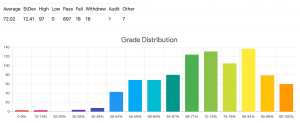No matter which major you’re in, the Psychology program always provides an array of interesting courses to take. Out of them, PSYC 314 is a worthwhile option to look at, as you’ll learn about different aspects of how psychology applies to everyone’s health, from day-to-day life to clinical settings.
Format of the course
PSYC 314 is a typical course with 3 hours of lectures per week. Sit in lecture, take notes, ask questions. The topics covered include stress and coping, health-related behaviours, health service utilization, pain, and chronic and life threatening illnesses, all from a psychosocial point of view.
The evaluation differs depending on which instructor you have. You can take a look at previous syllabi for the course here! With Dr. King, I had 3 equally weighted non-cumulative exams (2 midterms + final) with the option to write a paper, in which case all four assessments would be worth 25%. There was also a bonus 3% possible from HSP credits. If you’re a good writer, I highly recommend doing the paper!
With my prof, each exam consisted of half multiple choice questions from the textbook and half written questions from the lecture. The textbook questions were probably the most difficult as they sometimes required you to draw on extremely specific details. I recall one of the questions I had asking about the mechanism of action of a drug, which was a surprisingly sciencey question for a course with arts credit!
GPA 🙂 or 🙁
With all PSYC courses, the faculty implements a scaling policy that ensures that all classes have an average of about 65% and a standard deviation of 14%, before bonus marks are added. Thus, in theory, your mark in this course also depends on how everyone else does. In practice, though, my classes weren’t scaled as the professors did their best to make their exams just the right difficulty to avoid scaling. Exams had some quite specific multiple choice questions, which I presume were meant to help bring the average down, which still ended up being 73 in my class. However, most of the content is not too difficult, as you will have probably heard of a lot of it before! Here’s an overview from winter 2018:

Credits: ubcgrades.com
Verdict? To take or not to take
As my first 300-level PSYC course, I found this course interesting and engaging, although some of my classmates found the content a bit repetitive. Like most courses, if you put in some time to take notes on the textbook and review the lectures, you’ll do just fine. If you’re looking to learn about health from a psychosocial point of view, try this course out!
